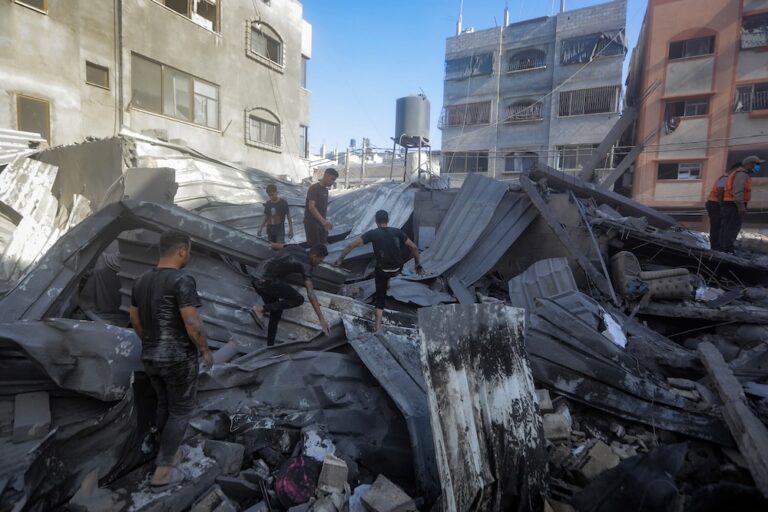(IPI/IFEX) – In a 12 October 2000 letter to Prime Minister Ehud Barak, IPI strongly condemned the deliberate targeting by Israeli armed forces of a Palestine radio station in Ramallah. According to IPI’s sources, helicopters of the armed forces fired missiles on the Voice of Palestine radio station on 12 October. As a result, the […]
(IPI/IFEX) – In a 12 October 2000 letter to Prime Minister Ehud Barak, IPI strongly condemned the deliberate targeting by Israeli armed forces of a Palestine radio station in Ramallah.
According to IPI’s sources, helicopters of the armed forces fired missiles on the Voice of Palestine radio station on 12 October. As a result, the radio station was forced off the air. Nearby apartment buildings appeared to be undamaged after the attack, which indicates that the station was singled out with the aim of closing it down. In addition, the Israeli army has said in statements released to the media that its targets were “carefully chosen”. The helicopter attacks also targeted the offices of Palestinian President Yassir Arafat, and were reportedly carried out in retaliation for the killing of an unspecified number of Israeli soldiers in Ramallah. Nearly 100 people have been killed in the violence, and many more wounded.
The action by the armed forces is deeply disturbing in light of the recent series of attacks on journalists. According to the information before IPI, on 29 September, Hazem Bader, a cameraman with The Associated Press, was wounded by a rubber-coated metal bullet fired by an Israeli sniper while filming clashes at al-Aqsa Mosque in Jerusalem.
In addition, on the same day, the following journalists were injured by shots fired by Israeli soldiers: Khaled al-Zeghary, a freelance journalist; Mahfouz Abu-Turk, a freelance photographer, and Awad Awad, a photographer with the Agence France-Presse news agency. Also, Khaled Abu Aker, a correspondent with the French television station France 2, was beaten by Israeli police at the Al-Aqsa mosque. The attack occurred after Abu Aker refused to comply with a police officer who demanded that the journalist hand over a rubber bullet that he had picked up off the ground.
On 2 October, Mazen Dana, a Hebron-based cameraman covering clashes on Hebron’s Shallalah Street for Reuters, was hit by live ammunition fired by Israeli forces. A day earlier, Dana had been hit by a rubber bullet. He reported the attack may have been deliberate. On the same day, Loay Abu Haykel, a Reuters photojournalist, was hit by a rubber bullet while covering clashes between Palestinians and Israelis. Wael al-Shiokhy, a journalist with the local television station TV Al-Nawras, was also shot at. Atta Oweisat, a photographer for the Israeli press agency Zoom 77, was beaten by Israeli policemen with clubs while covering a Palestinian demonstration in Jabel Moukaber, near Jerusalem on 4 October.
Recommended Action
Send appeals to authorities:
– stating that you regard these attacks on journalists and the targeting of the radio station as gross violations of everyone’s right to “seek, receive and impart information and ideas through any media and regardless of frontiers”, as guaranteed by Article 19 of the UN Universal Declaration of Human Rights
– urging His Excellency to ensure that these acts are halted immediately and unconditionally
– further urging him to ensure that journalists in Israel and the Israeli-occupied Territories are allowed to carry out their profession safely and without further harassment
Appeals To
APPEALS TO:
His Excellency Ehud Barak
Prime Minister
Kiryat Ben-Gurion
3 Kaplan St, P.O. Box 187
91919 Jerusalem
Israel
Fax: + 972 2 513 950
Please copy appeals to the source if possible.


